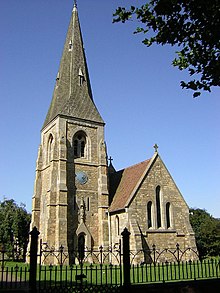All Saints' Church, Harby: Difference between revisions
Add BOT tag & OS ref |
Nedrutland (talk | contribs) |
||
| Line 152: | Line 152: | ||
==History== |
==History== |
||
The church in Harby was endowed with a chantry chapel by King Edward I in 1294, following the death of Queen Eleanor. However, the chapel was dissolved at the Reformation and the church became a chapel of ease to [[North Clifton]]. |
The church in Harby was endowed with a chantry chapel by King [[Edward I of England]] in 1294, following the death of Queen [[Eleanor of Castile|Eleanor]] nearby in 1290.<ref>{{Cite encyclopedia |author=John Carmi Parsons |title=Eleanor (1241–1290) |encyclopedia=Oxford Dictionary of National Biography |location=Oxford, United Kingdom |publisher=OUP |date=2004 |doi=10.1093/ref:odnb/8619 |url=http://www.oxforddnb.com/view/article/8619 |accessdate=28 November 2015 |url-access=subscription}}</ref> However, the chapel was dissolved at the Reformation and the church became a chapel of ease to [[North Clifton]]. |
||
By the middle of the 19th century it was in a poor state of repair. John Thomas Lee of London was appointed as the architect for a new building. Construction began in 1874 and it was consecrated on 2 August 1877. The old church was then demolished and some parts re-used in the new building. |
By the middle of the 19th century it was in a poor state of repair. John Thomas Lee of London was appointed as the architect for a new building. Construction in [[Early English Period|Early English]] style began in 1874 and it was consecrated on 2 August 1877. The old church was then demolished and some parts re-used in the new building. In the east wall of the tower is a statue in memory of [[Eleanor of Castile]], Queen Consort of Edward I. |
||
In 1963, the shingles on the spire were replaced with Canadian cedar. |
In 1963, the shingles on the spire were replaced with Canadian cedar. In January 2010 work began on renovating the roofs, incorporating insulation, a breathable membrane and all new tiles. |
||
In January 2010 work began on renovating the roofs, incorporating insulation, a breathable membrane and all new tiles. |
|||
It is part of a group of parishes which includes |
It is part of a group of parishes which includes |
||
Latest revision as of 07:13, 1 October 2024
| All Saints' Church, Harby | |
|---|---|
 All Saints' Church, Harby | |
 | |
| 53°13′27.80″N 0°41′9.76″W / 53.2243889°N 0.6860444°W | |
| OS grid reference | SK 87811 70512 |
| Location | Harby, Nottinghamshire |
| Country | England |
| Denomination | Church of England |
| History | |
| Dedication | All Saints |
| Consecrated | 2 August 1877 |
| Architecture | |
| Heritage designation | Grade II listed[1] |
| Architect(s) | John Thomas Lee |
| Specifications | |
| Bells | 6 |
| Administration | |
| Diocese | Diocese of Southwell and Nottingham |
| Archdeaconry | Newark |
| Deanery | Newark and Southwell |
| Parish | Langford |
All Saints' Church, Harby is a Grade II listed parish church in the Church of England[2] in Harby, Nottinghamshire.
History
[edit]The church in Harby was endowed with a chantry chapel by King Edward I of England in 1294, following the death of Queen Eleanor nearby in 1290.[3] However, the chapel was dissolved at the Reformation and the church became a chapel of ease to North Clifton.
By the middle of the 19th century it was in a poor state of repair. John Thomas Lee of London was appointed as the architect for a new building. Construction in Early English style began in 1874 and it was consecrated on 2 August 1877. The old church was then demolished and some parts re-used in the new building. In the east wall of the tower is a statue in memory of Eleanor of Castile, Queen Consort of Edward I.
In 1963, the shingles on the spire were replaced with Canadian cedar. In January 2010 work began on renovating the roofs, incorporating insulation, a breathable membrane and all new tiles.
It is part of a group of parishes which includes
- St Bartholomew's Church, Langford
- St Giles' Church, Holme
- St Cecilia's Church, Girton
- St George the Martyr's Church, North & South Clifton
- All Saints' Church, Collingham
- St John the Baptist's Church, Collingham
- St Helena's Church, South Scarle
- Holy Trinity Church, Besthorpe
- St Helen's Church, Thorney
- All Saints' Church, Winthorpe
See also
[edit]References
[edit]- ^ Historic England. "Church of All Saints, Churchyard wall, railings and gates (1157149)". National Heritage List for England. Retrieved 26 June 2017.
- ^ The Buildings of England: Nottinghamshire: Nikolaus Pevsner.
- ^ John Carmi Parsons (2004). "Eleanor (1241–1290)". Oxford Dictionary of National Biography. Oxford, United Kingdom: OUP. doi:10.1093/ref:odnb/8619. Retrieved 28 November 2015.
